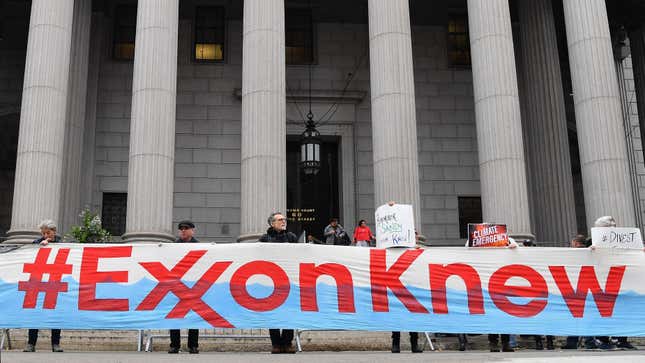
In a last-ditch effort to avoid a Massachusetts lawsuit, Exxon claimed being sued violated its First Amendment right to free speech. On Tuesday, that motion to dismiss the suit was thrown out in the state’s Supreme Judicial Court. The lawsuit, which accuses Exxon of lying for decades about the climate impacts of fossil fuels, will now move forward. Earlier this week, another lawsuit against big oil progressed in Rhode Island, too.
The Massachusetts lawsuit was first brought by the state’s attorney general, Maura Healy, in 2019 and amended with more allegations in 2020. Although there’s lots of stuff Exxon could and should probably be held accountable for, Healy’s complaint focuses on the company’s decades of deception surrounding its environmental impacts.
Exxon has known about climate change since at least the 1970s. But, as alleged in the lawsuit, “Exxon systematically and intentionally has misled Massachusetts investors about material climate-driven risks to its business and has deceived consumers about the central role its fossil fuel products play in causing climate change.”
Exxon’s latest, failed motion to dismiss was based on legislation known as “anti-SLAPP” laws. SLAPP stands for strategic lawsuits against public participation and is meant to describe a type of baseless lawsuit brought by (mostly) rich people and corporate stakeholders to stifle critique (theoretical example: Exxon countersues the AG Healy). So, anti-SLAPP laws are generally meant to protect the speech of corporate critics.
Massachusetts’ highest court has rejected Exxon’s attempt to weaponize anti-SLAPP laws, declaring that anti-SLAPP legislation doesn’t apply to lawsuits brought by the government.
“Once again, Exxon’s attacks on my office and our case have been rejected by the courts,” said Healy in a statement. “Today’s ruling is a resounding victory in our work to stop Exxon from lying to investors and consumers in our state. Exxon’s repeated attempts to stonewall our lawsuit have been baseless, and this effort was no different. We look forward to proceeding with our case and having our day in court to show how Exxon is breaking the law and to put an end to the deception once and for all.”
Previously, the fossil fuel giant had also attempted to weasel out of being sued by claiming that Healy’s complaint was politically motivated. (The attorney general is currently running for governor.) However, a court struck this down, too.
On Monday, a similar case in Rhode Island against multiple fossil fuel companies, including Exxon and Chevron, also moved forward. That lawsuit aims to force companies to pay for damages associated with climate change, on the basis that taxpayer money is used to fund infrastructure repairs after climate-change associated disasters like storms and floods.
The defendant companies had tried to keep the case in federal courts, where they’d likely have an advantage, but the U.S. Court of Appeals opted to send the case back to the state. State courts often have a wider latitude to demand documentation in their discovery process than their federal counterparts. Thus, lawsuits at the state level often result in big records reveals that companies would rather avoid.
The Rhode Island and Massachusetts court battles are part of string of state and city efforts to take oil companies to task. However, previous cases have ended in wins for fossil fuels. Maybe one day, justice will be able to aim bigger, but for now, at least some level of consequence is up for consideration. In theory, every dime that Exxon has to spend on lawyers is 10 cents less toward polluting the planet.